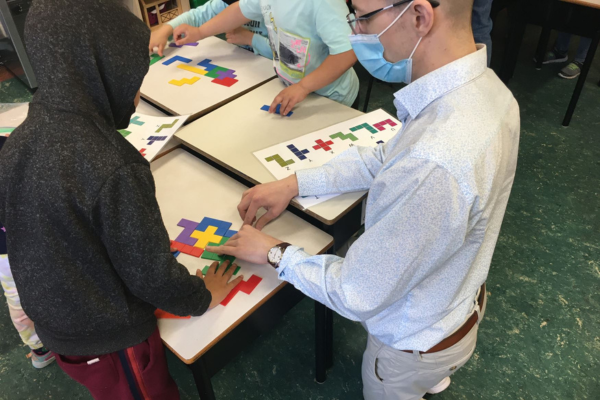Posted: May 19, 2023
By: Jocelyn Adams
For Giving Power
 Math Circles program director Tom Potter instructs students on math problems. (Submitted photo)
Math Circles program director Tom Potter instructs students on math problems. (Submitted photo)
For the past 14 years, Nova Scotia Math Circles, an educational outreach program coordinated by Dalhousie’s Department of Mathematics and Statistics, has helped to inspire Nova Scotian students to pursue mathematics.
The guiding vision behind the program is to foster an enthusiasm for math through interactive and creative presentations. Last year, the program reached nearly 700 students through 28 virtual class visits, and more than 3,800 students through 43 in-person school visits.
“We’re trying to engage students in math, and I think we’re succeeding,” says Tom Potter (BSc’09, MSc’14), Program Director for Math Circles. “Students enjoy our presentations and, as a result, they like math. I feel Math Circles has a direct impact on education and how motivated students are to study math — which ultimately impacts the fields of science and technology.”
“Adding” interest early
The program reaches students of all ages, but Potter explains it has the most impact on younger children.
“Elementary school is a good time to get kids excited about math,” he says. “At that age, you can form impressions and formulate an opinion. It’s when math starts to become challenging that the interest can fade. We’re trying to keep them interested and enthusiastic about it.”
Maria Mihai, a participant in Math Circles for the past seven years, is what you would call a math enthusiast. The 15-year-old is a regular attendee and competes at regional and national math competitions.
“Math Circles is one of my favourite activities,” she says. “I started going in fourth grade, and it’s always brought out the fun side of math. I love going every time.”
The program also offers an opportunity to learn from world-class instructors.
“Some of our presenters are post-docs or professors who share cutting-edge research in applications such as biology or computer science,” says Potter. “It’s cool for students to experience this, especially for students who need this type of enrichment. It’s great that Math Circles can offer this.”
Bouncing back post-pandemic
Despite unforeseen challenges during the COVID-19 pandemic, Math Circles continued to thrive and even expanded its reach to schools across Nova Scotia and Ontario.
When Potter began his role in 2020, like many educators, he was tasked with moving the program into a virtual classroom.
“I developed a good chunk of our presentations into virtual classroom visits,” says Potter, a PhD candidate in Mathematics at Dalhousie. “The classrooms joined via Zoom or Google Meet, and we would broadcast on the front screen. Students could come up and show us their solutions.”
With virtual presentations, the program has been able to be more inclusive of classrooms located outside of the Halifax Regional Municipality, and Potter says they will continue to make learning as accessible as possible.
“We try to keep things minimal, in terms of what the students need,” he says. “Maybe it’s scissors to cut something or crayons, but we try to make everything available in a virtual format.”
Community support
Since 2014, Eastlink has been a proud supporter of Math Circles, and has contributed $100,000 annually to the development of the program.
“We are very proud to be part of a program that continues to have meaningful and long-lasting benefits to students, teachers and schools right across the province,” says Eastlink Executive Vice Chair Lee Bragg. “I’ve had the distinct pleasure of seeing first-hand the energy and commitment Dalhousie brings to finding creative ways to engage students at all grade levels with a 360-degree approach that begins with inspiring kids in math at an early age through to supporting them as they explore what’s next in their academic careers.”
Eastlink’s support for the program has a lasting impact on students, the program and our surrounding communities.
“It’s an amazing help for Math Circles,” says Potter. “We wouldn’t be able to operate on the scale that we do without Eastlink’s support. It would be extremely difficult to do the things we’re doing — visiting schools locally and further away. Eastlink allows us to make this happen.”